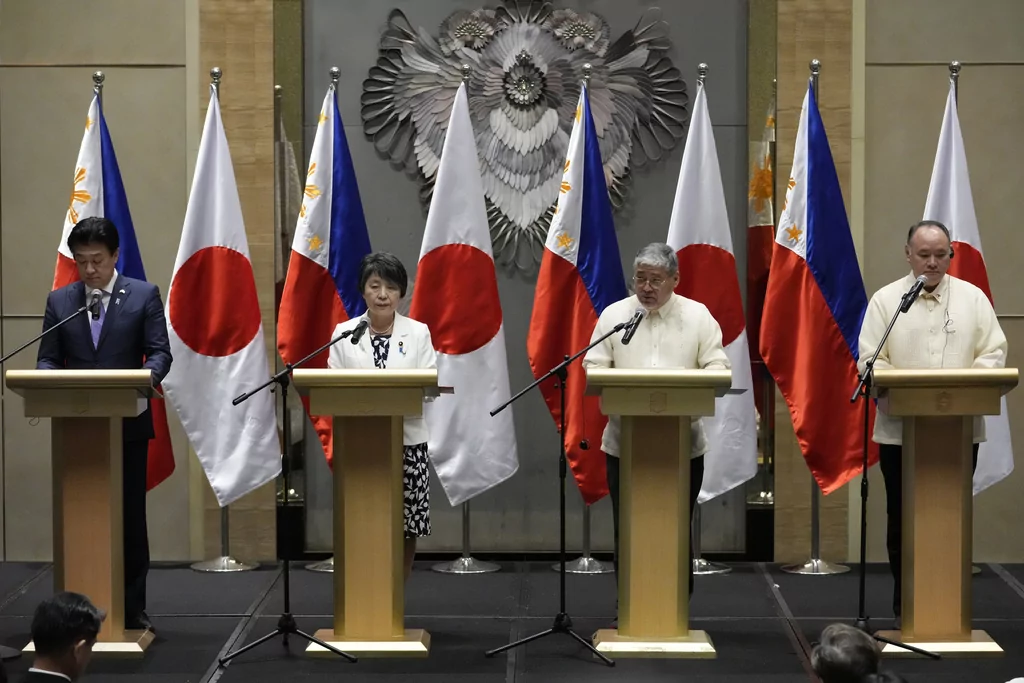

Japan and the Philippines have agreed to a “groundbreaking” agreement for cooperation between their militaries as both countries prepare for increasing tensions with China.
“With this signing, we look forward to increased cooperation and work … in order to bring greater stability to this part of the world,” Philippine Defense Secretary Gilberto Teodoro said during a Monday press conference.
Their agreement is a signal development in the emergence of a so-called latticework of relationships between U.S. allies, a series of mutually reinforcing relationships that officials in Washington hope will function as a bulwark against China’s potential aggression. The pact, known as a reciprocal access agreement, could fortify the Philippines in an increasingly violent dispute with Beijing in the South China Sea and perhaps even buttress U.S. efforts to deter China from an attack on Taiwan.
“As the security environment surrounding us becomes more and more severe, it is extremely important to highlight cooperation and coordination with our allies and with like-minded countries in order to maintain peace and stability in the Indo-Pacific region,” Japanese Defense Minister Minoru Kihara told reporters “The RAA signed today is groundbreaking, and I hope that cooperative exchanges between the [Japanese Self-Defense Forces] and the Philippines will become even more active.”
The agreement contemplates “bilateral [and] multilateral [military] exercises and cooperation on defense equipment and technology,” according to a joint statement. The regional implications of such a pact were signaled at the opening of the document, as the officials “strongly opposed any unilateral attempts to change the peacefully established status quo by force or coercion,” and referred specifically to the East China Sea and South China Sea — where Japan and the Philippines, respectively, have territorial disputes with China — as well as Taiwan and the Korean Peninsula.
“The Ministers likewise discussed expanding strategic cooperation among Australia, Japan, the Philippines, and the United States, and underscored the close collaboration of the four nations in promoting the shared vision for a free and open Indo-Pacific through the conduct of the Maritime Cooperative Activity among the four armed/defense forces,” they said.
They also celebrated the deal as a “historic milestone” for the two countries, less than a century after imperial Japanese forces used the island now known as Taiwan as a launchpad for an invasion of the Philippines the day after the surprise attack on Pearl Harbor, a historical backdrop that China has hoped would impede such cooperation.
“The Asia-Pacific region does not need any military bloc, still less groupings that incite bloc confrontation or a new Cold War,” Chinese Foreign Ministry spokesman Lin Jian said Monday. “Japan bears serious historical responsibilities for its aggression and colonial rule over the Philippines and other Southeast Asian countries during WWII. Japan needs to reflect on that part of history and act prudently in fields related to military and security.”
Decades later, China and Japan have undergone a role reversal, at least to a degree, as Tokyo now coordinates with the United States and other democracies in the region while Beijing’s territorial ambitions stoke anxiety about a potential war in the region.
“The region has got two choices. The first is that they can submit, and as an end result give up some of their freedoms … or they can arm to the teeth,” Adm. Samuel Paparo, the commander of U.S. Indo-Pacific Command, told the Washington Post’s Josh Rogin in a recent interview. “Both cases have direct implications to the security, the freedom and the well-being of the citizens of the United States of America.”
Paparo, who took over his current office in May, is tasked with preparing the U.S. military to counter China’s People’s Liberation Army forces, even as Chinese strategists work to meet Chinese General Secretary Xi Jinping’s goal of being ready for a Taiwan conflict by 2027.
“I want to turn the Taiwan Strait into an unmanned hellscape using a number of classified capabilities,” Paparo said. “So that I can make their lives utterly miserable for a month, which buys me the time for the rest of everything. … It’s real and it’s deliverable.”
CLICK HERE TO READ MORE FROM THE WASHINGTON EXAMINER
Kihara, the Japanese defense minister, emphasized the strategic ramifications of defense cooperation between Tokyo and Manila.
“The Philippines and other Southeast Asian nations are situated in a very strategically important region, placed in a key junction of Japan’s sea lanes,” he said. “Advancing defense cooperation and exchanges with the Philippines is important for Japan.”







